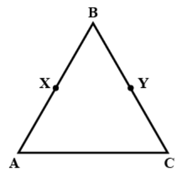Euclid's Definitions, Axioms and Postulates
Euclid's Definitions, Axioms and Postulates: Overview
This topic covers concepts, such as Euclidean Geometry, Euclid's Definitions, Euclidean Dimension, Euclid's Definition of a Point, Euclid's Definition of a Line, Euclid's Definition of a Surface, Euclid's Definition of a Straight Line, Euclid's Definition of a Plane Surface, Limitations of the Definitions Given by Euclid, Euclid's Axioms, Consistency of Axioms, First Postulate of Euclid, Second Postulate of Euclid, Third Postulate of Euclid, Fourth Postulate of Euclid & Fifth Postulate of Euclid etc.
Important Questions on Euclid's Definitions, Axioms and Postulates
The edges of a plane surface are
Number of straight lines passing through the point is
A line which lies evenly with the points on itself is called a
Which of these following statement is true.
The edges of the surface are
"A circle can be drawn with any centre and any radius" is Euclids
"A circle can be drawn with any centre and any radius." is Euclids
"A terminated line can be produced indefinitely." is Euclids
Which of the following is a true statement?
The total number of propositions in the Elements are:
is of the same age as and is of the same age as . Euclid's which axiom illustrates the relative ages of and ?
The number of interwoven isosceles triangles in Sriyantra is
Fill in the blanks:
A is breadthless length. A is a line which lies evenly with the points on itself. A is that which has length and breadth only. A is a surface which lies evenly with the straight lines on itself.
Choose the correct option:
| P | Q | R | S | |
| (a) | Line | Straight Line | Surface | Curved Surface |
| (b) | Point | Straight Line | Surface | Curved Surface |
| (c) | Line | Straight Line | Surface | Plane Surface |
| (d) | Point | Straight Line | Surface | Plane Surface |
It is known that if , then . State the Euclid's axiom that best illustrates this statement.
Quantities which are equal to the same quantity are equal to each other. The whole is equal to the sum of its parts and hence, whole is greater than the parts.
If in a line segment and , then
In the given figure, , is mid-point of and is mid-point of . Using an Euclid's axiom, we have
For every line and for every point (not on ), there does not exist a unique line through
In the given figure, if and , then

Priya and Pooja have the same amount of money. If each gets more, how will their new amounts be compared?
Euclid's axiom is
